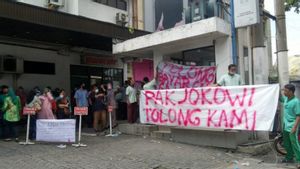JAKARTA - Chairman of the Indonesian Broadcasting Commission (KPI) Agung Suprio said his party was working on fines for television and radio broadcasts that did not follow the regulations.
Agung explained that the fines were part of a priority program carried out by the Central KPI. The purpose of sanctions is to provide a deterrent effect for violators of content rules that do not comply with broadcasting provisions.
"So KPI is trying to reactivate (the fines for broadcasting violations) after some time coordinating it with the Ministry of Communications and Informatics and the Ministry of Finance so that KPI can issue fines and it will later be included in PNBP (Non-Tax State Revenue)," Agung said, quoted by Antara, Monday. , June 7th.
Later, the fines for broadcasting violations will be based on three pre-existing regulations including Article 55 of Law 32/2002 on Broadcasting, Article 465 paragraph 2 of Government Regulation (PP) number 5/2021 and Article 86 paragraph 2 of PP 46/2021.
There is also the maximum fine for broadcasts whose broadcast content does not comply with applicable regulations, which is Rp. 1 billion for television and Rp. 100 million for radio.
Agung said that for administrative sanctions, fines would not be imposed on community-based broadcasters.
Fines are an increase in sanctions on subjects who have previously received written warnings.
Only cigarette advertisements that run during productive hours can be directly subject to fines by KPI.
Agung said that in order to impose fines for broadcast violators, the KPI must first be included in the laws and regulations regarding PNBP.
To accommodate this, the Ministry of Communications and Informatics plans to make a PP Draft for PNBP adjustment within the Ministry of Communications and Informatics.
The imposition of fines will also be assessed from the coverage of the broadcast program, whether local, regional relay, or national relay.
SEE ALSO:
In addition, broadcast time also influences starting from productive hours (05.00-19.00 western Indonesia time), non-productive (22.00-05.00 western Indonesia time), or in prime time (19.00-22.00).
"So, for example, the violation occurs during productive hours but broadcasts are regional, the fine is smaller than national violations and during prime time," said Agung.
In addition to preparing administrative fines, KPI also prepares revisions to the Broadcasting Code of Conduct and Broadcast Program Standards (P3SPS) which are expected to be completed by the end of 2021 or 2022, prepares promotion and socialization of Analog Switch Off (ASO), and prepares blueprints for the use of artificial intelligence to conduct broadcast surveillance to digital television.
The English, Chinese, Japanese, Arabic, and French versions are automatically generated by the AI. So there may still be inaccuracies in translating, please always see Indonesian as our main language. (system supported by DigitalSiber.id)

















